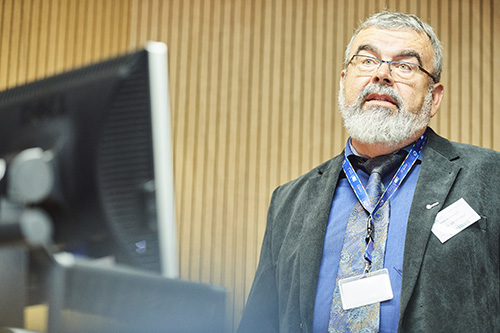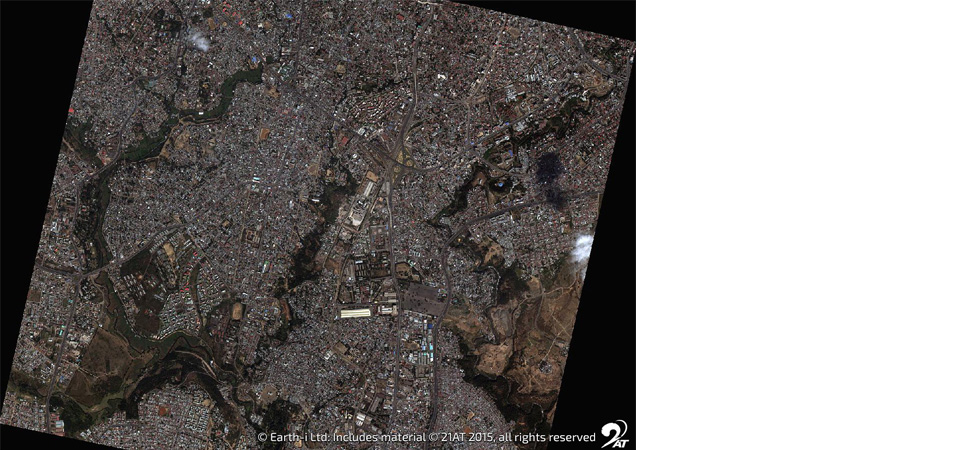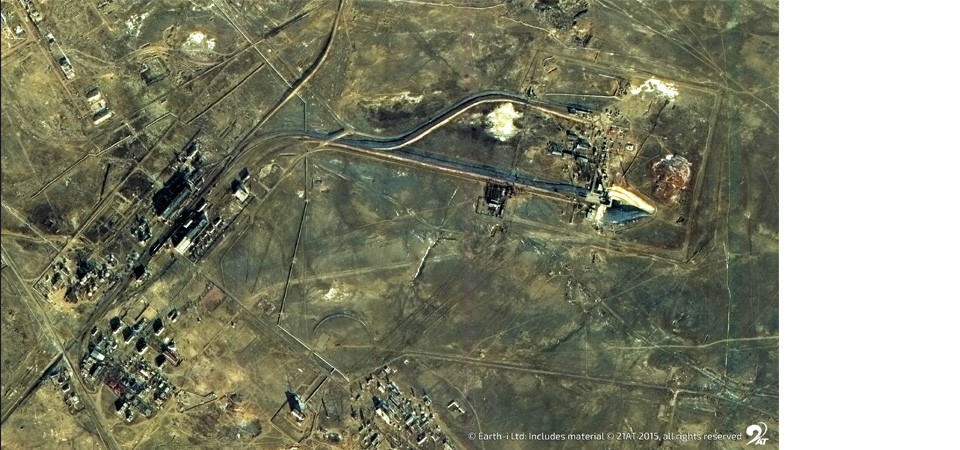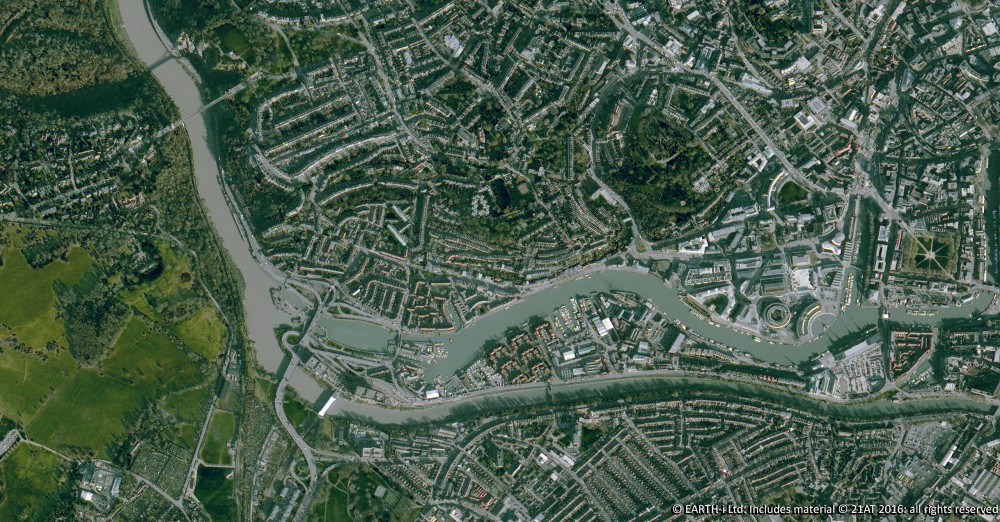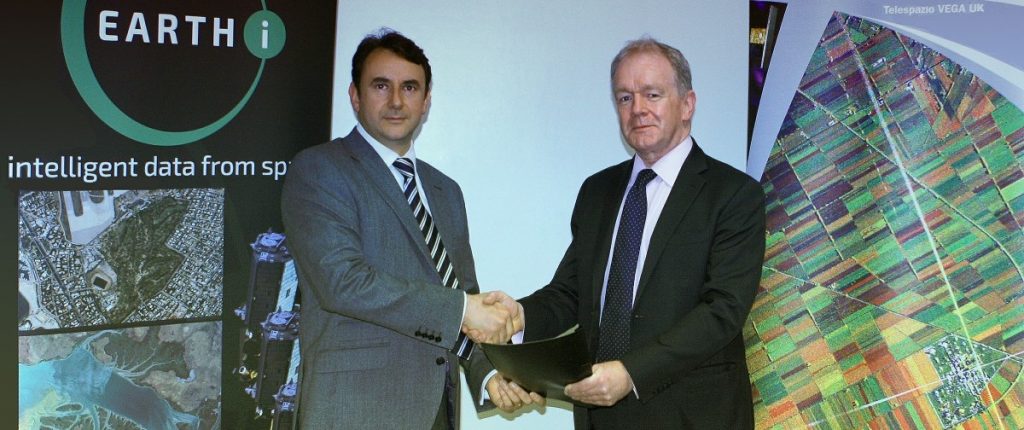Kinini Coffee is an innovative and entrepreneurial coffee company in Rwanda, with a strong focus on social enterprise to improve the livelihoods, economic security and sustainability of its coffee farmers. The company became a partner in the ACCORD programme (funded by the UK Space Agencies International Partnership Programme) in 2018 to increase the level of support offered to its coffee farmers in Northern Province and help them tackle the impact of climate change.
The company sources coffee beans from around 250 hectares of fields between 1,800-2,500 metres above sea level experiencing varying temperature levels of 17-23 degrees. The climate, altitude and volcanic soils allow the Bourbon-variety arabica coffee cherries to mature slowly, giving a good-sized bean that is rich in flavour and aroma.
We talked to the founders of Kinini Coffee, Jacqueline Turner and Malcolm Clear, about their company, the challenges of climate change in Rwanda, and the impact of the ACCORD programme on their farmers.
What is Kinini Coffee’s business model?

One of the key innovations in the Kinini business model is to embrace and influence the full coffee cycle from planting trees to the supply of green coffee beans direct to customers. This entails engagement from production through processing to supply and export.
Kinini therefore engages with farmers right from the start of production. Supplying resilient and high yielding coffee seedling varieties, delivering farmer support services, running demonstration plots and agronomic training, and implementing fair trade certifications are good examples of their end-to-end approach to helping farmers achieve the best possible results. In addition, they provide the wet mills and processing infrastructure, and plan to develop modern warehouses, upgrade washing stations and infrastructure, and develop a dry mill.
For Kinini the benefit is a long-term sustainable business through better quality coffee beans in greater quantities to serve its growing global market demand. Beyond these commercial goals, their social mission is to improve the livelihoods of more than 1,000 coffee farmers, most of whom are women farmers organised into a cooperative enterprise. Kinini has built long-term partnerships with these farmers aligning Kinini’s success with them in a partnership.
How does this partnership approach benefit farmers?
Farmers are paid a premium for top grades and receive additional bonuses for quality at the end of coffee season. This incentivizes farmers to produce higher quality coffee and the ACCORD service helps them achieve that through improved agronomic practices. It creates a win-win partnership for coffee company and farmer.
This commitment to partnership with their farmers is what drove Kinini founders Jacquie and Malcolm to join the ACCORD programme. They wanted to reinforce the connection between the coffee company and its growers and offer an advice service to their farmers that would build mutual benefit in supplying the markets with high quality coffee on a sustainable basis.
This greater sense of connection with Kinini comes from a combination of the daily and weekly ACCORD message alerts and on-the-ground agronomic support from company representatives. This reinforces the relationship between farmers and coffee company, with farmers feeling closely supported, their crops monitored and they themselves are cared for by the company. The service is used to improve farmer skills and sensitize them to their environment, the advice service backed up by physical contact with agronomists and farmer training conducted at demonstration plots. As a result, Kinini has been able to achieve higher quality and volumes compared to previous years before ACCORD service was launched.
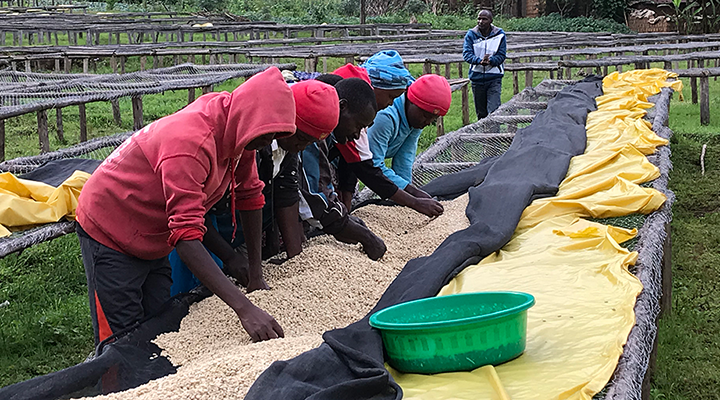
What expectations does Kinini have of the ACCORD programme?
Kinini Coffee looked to ACCORD and the WeatherSafe platform it uses, to give them greater and more timely insights, with weather predictions and more precise agronomy not previously available just a couple of years’ ago. They expected that farmers would acquire more knowledge (coffee growing practices, inputs and expected quality standards) and improve farming practices, quality and yields. They didn’t expect farmers to adopt this service quickly, assuming it would take time for a new technology to be embraced.
Kinini however reports that farmers have in fact quickly adopted the service and largely with open minds. “Farmers are receptive and are now producing more coffee and quality. Quality has improved by 20%, and has been improving each year, and our international buyers have experienced consistent quality all through” said Malcolm Clear.
Kinini explains that there are many factors that determine coffee quality and yields requiring a wide range of initiatives. Jacqueline and Malcolm agree that the ACCORD service has contributed significantly to this effort, increasing farmers’ awareness of coffee agronomy, improving adaptation to changing climate conditions, and the adoption of better farming practices.
How does ACCORD address the threat of climate change?
Climate change has impacted Rwanda and it has suffered from floods from heavy rainfall, especially in the north-western highlands of Rwanda, and periodic droughts in the eastern and southern regions (USAID, 2012). The variability of rainfall has a substantial impact on rain-fed agriculture, including coffee. Coffee is highly sensitive to climate change. Models indicate that the adverse impact of climate change on arabica coffee trees, potentially reducing the areas suitable for arabica production by 20–50% by 2050 (CGIAR, 2015).
Rwanda’s annual average temperature has increased 0.35°C per decade between 1971 and 2010. The country could experience increased rainfall intensity during both rainy seasons. With higher humidity and temperatures in the future, crop pests and diseases could expand their ranges among other potential impacts.
The ACCORD service addresses these threats from climate change by advising farmers on weather conditions a few days in advance and providing advice to enable farmers to adapt their practices and mitigate against negative effects.
Have farmers embraced the new technology?
It has been sometimes difficult to make many farmers adopt new learnings quickly, but ACCORD is gradually influencing the farmers behaviour positively for the long term. The application of modern technology to smallholder farming has been demystified through the ACCORD service. ACCORD is simple, user friendly, and has a direct effect on farmers at grassroots. Its impact is felt quickly, and the weather prediction is very accurate.
Farmers are happy with the service. 48 Kinini farmers participated in latest survey, their feedback indicating that more than 98% of farmers have reported a positive change in farming practices, and 92% are taking the recommended actions.
There were a few farmers who waited to see how beneficial the service is. With introduction of the bonus system by Kinini, they have started working hard on their farms to improve quality and earn their bonus. Kinini provides this as an incentive to farmers to improve coffee quality and ACCORD is an essential tool in achieving that goal – despite the difficult challenges of climate change.
To find out more, visit www.earthi.space/accord
International Partnership Programme
The International Partnership Programme (IPP) is a five-year, £30 million-per-year initiative run by the UK Space Agency. It focuses on using the UK space sector’s research and innovation strengths to deliver sustainable economic or societal benefit to developing economies around the world. IPP is part of, and is funded from, the Department for Business, Energy and Industrial Strategy’s Global Challenges Research Fund (GCRF). GCRF is a £1.5 billion fund announced by the UK Government which supports cutting-edge research and innovation on global issues affecting developing countries.


